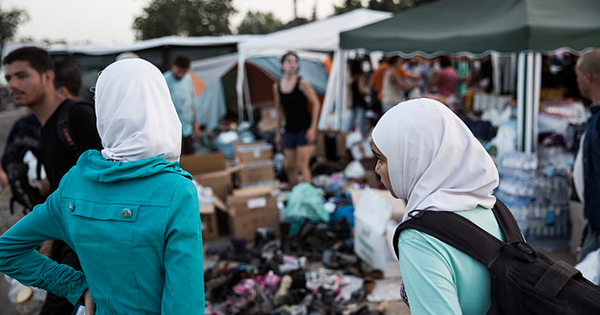
As Europe panics over the biggest migration of people since the end of the Second World War, responses have ranged from hostility and rapid barrier construction in the eastern bloc to official welcome in Germany and the Nordic countries. The public attitude has likewise varied from acts of aggression to generosity, including offers to house those arriving from war-torn Syria. In Britain, typically, one of the most prominent public debates has been over semantics, including whether public broadcasters should refer to the masses of people arriving on its borders as “refugees” or “migrants”—the latter having achieved an increasingly negative connotation in recent decades.
It’s easy to forget that humans are a migratory species. Owing to our extraordinary adaptability and resourcefulness, we are not tied to any particular habitat or geography. We live on all seven continents and even have a permanent presence in orbit on the International Space Station. We left our evolutionary home in Africa some 60,000 years ago to colonize the plains, coasts, mountains, forests, and valleys of Earth, creating our own environments as we went through land clearance, farming, and the construction of cities.
Humans still migrate for the same reasons: to escape danger, to find better conditions, to experience change and adventure, or because we have fallen in love with someone from somewhere else.
Look at the family names of the people you know. Most of them will have originated in other towns, countries, or continents. Look at the language you use, peppered as it is with words from far-flung places. The food we eat, the clothes we wear, and the knowledge we share are drawn from a mosaic of cultures. Our mixing has helped produce the most advanced civilization ever known.
So how should Europe respond to the current migrant crisis? The new arrivals—most of them young—offer the aging continent a welcome opportunity to prolong its leading political-economic position on the world stage. All countries, including rich Arab states, have a United Nations-mandated obligation to protect the four million Syrian refugees fleeing the horrors of Assad and the Islamic State (a small number compared to the 15 million refugees resulting from the Second World War). This should not be interpreted as simply putting up tents in a desert, but as looking after people’s medium-to-long-term interests, including provision of schools and jobs. The best way to ensure this is to welcome migrants into safe, functioning countries and to enable them to continue their lives. The sooner this is achieved, the sooner they will be able to contribute to society and their host economies.
Refugees fleeing unsafe conditions are just one type of migrant approaching Europe’s borders, and nations are not bound (under UN rules) to accept economic migrants. But it would be shortsighted and foolish to turn them away. There is no need to fear foreign workers, as most city-dwellers well know. Those who have already demonstrated initiative and determination to start out in a new country and language are—as study after study shows—net economic contributors. They are also important cultural contributors, bringing with them flavors of other places and generating exciting fusions of host and origin cultures.
Migrants are becoming not just desirable but increasingly necessary, especially in Europe. As birthrates decline, migrants will make up the workforce, provide pensions, and satisfy the growing needs of an aging population. Instead of shunning new arrivals, countries should ease their journey and invest in appropriate infrastructure to support the additional population. They will be more than repaid.

